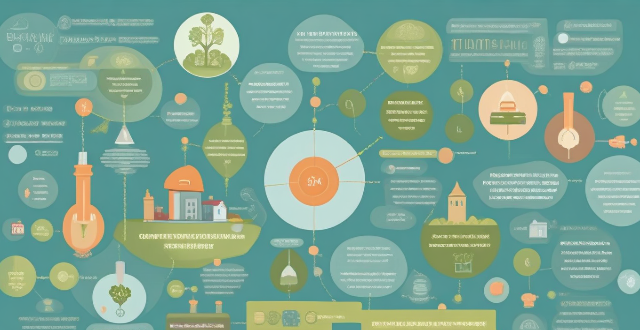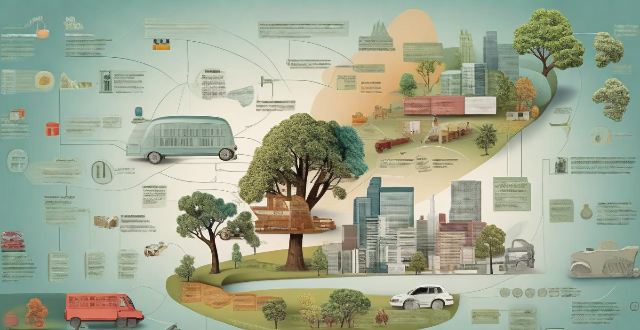Economic Legislation

What are the economic implications of enacting stringent climate change legislation ?
The article discusses the economic implications of stringent climate change legislation, which include job creation in renewable energy and green infrastructure sectors, potential increases in energy and food prices, new business opportunities in innovation and carbon trading, and investment in clean technology leading to economic growth. However, there are also short-term transition costs and job displacement issues. Despite these challenges, the long-term benefits such as improved air quality and increased resilience against natural disasters make the implementation of such legislation beneficial for future generations.

Can environmental legislation effectively reduce pollution ?
Environmental legislation has the potential to effectively reduce pollution, but its success depends on various factors such as enforcement and compliance, public awareness and participation, technological innovation, political will, international cooperation, and economic considerations. Strong regulatory bodies, education campaigns, investment in clean technology, government prioritization of environmental protection, global collaboration, and balancing environmental goals with economic development are all crucial for the effectiveness of environmental legislation. Achieving lasting improvements in environmental quality requires ongoing effort from all sectors of society.

How does environmental legislation differ across countries ?
Environmental legislation varies across countries due to differences in economic development, political systems, cultural values, and environmental priorities. The legal framework for environmental protection ranges from comprehensive laws covering various issues to piecemeal legislation addressing specific problems. Enforcement mechanisms also differ, with some countries having strong regulatory bodies and others lacking institutional capacity or political will. Penalties and sanctions for non-compliance vary widely, as do opportunities for public participation in decision-making processes. International cooperation is crucial but varies in commitment and action among countries. Overall, these differences highlight the need for greater coordination and cooperation to address global environmental challenges effectively.

What challenges have been faced in the adoption and enforcement of climate change legislation ?
Climate change is a global issue that requires immediate attention and action. The adoption and enforcement of climate change legislation are crucial steps in mitigating the effects of climate change. However, several challenges have been faced in this process, including: 1. Lack of Political Will: Governments often prioritize short-term economic gains over long-term environmental sustainability, making it difficult to pass and implement effective climate policies. 2. Economic Barriers: The high cost associated with transitioning to clean energy sources can be a significant barrier to adopting and enforcing climate change legislation. Additionally, the shift towards clean energy can lead to job losses in traditional industries such as fossil fuel extraction and manufacturing. 3. Legal and Institutional Hurdles: Many countries lack comprehensive legal frameworks for addressing climate change, which can hinder the adoption and enforcement of effective climate policies. Weak enforcement mechanisms can also undermine the effectiveness of climate change legislation. 4. Public Awareness and Participation: Public awareness and understanding of climate change issues are essential for the successful adoption and enforcement of climate change legislation. However, many people still lack a basic understanding of the science behind climate change and its potential consequences. Active public participation is crucial for driving change and holding governments accountable for their actions on climate change. Addressing these challenges requires a concerted effort from governments, civil society organizations, businesses, and individuals worldwide. Only by working together can we hope to mitigate the effects of climate change and secure a sustainable future for all.

How effective has the recent climate change legislation been in reducing greenhouse gas emissions ?
The effectiveness of recent climate change legislation in reducing greenhouse gas emissions has been variable, with some regions and policies showing significant success while others face numerous barriers.

How has environmental legislation evolved over time ?
Environmental legislation has evolved over time, reflecting growing awareness of environmental issues. Early stages focused on preserving natural resources and conserving wildlife habitats, while post-World War II saw a shift towards pollution control through air and water quality regulations. The late 20th century introduced comprehensive environmental protection laws addressing multiple aspects of environmental degradation. Today's legislation prioritizes sustainable development and climate change mitigation, with a focus on public participation and transparency in decision-making processes.

What are the consequences of not having adequate environmental legislation ?
The text discusses the importance of adequate environmental legislation and its absence's consequences. It outlines the impact on environmental degradation, human health, economic stability, and social welfare. The introduction emphasizes the need for such laws for sustainable development and planet protection. Four main points are discussed: 1. Environmental Degradation includes loss of biodiversity, pollution, deforestation, and ocean acidification. 2. Human Health Impacts cover respiratory problems, waterborne diseases, and food safety concerns. 3. Economic Implications involve resource depletion, job losses, and tourism decline. 4. Social Welfare Issues include inequality, displacement, and conflict over resources. The conclusion stresses the urgency for governments worldwide to implement and enforce strong environmental laws for a sustainable future.

How does climate change legislation influence corporate sustainability practices ?
Climate change legislation significantly influences corporate sustainability practices by setting standards for environmental responsibility. It compels companies to report on their environmental impact, use market-based mechanisms like cap-and-trade systems, and consider tax incentives or penalties in their operations. This legislation also creates investor pressure through ESG criteria and shareholder resolutions, leading companies to enhance their sustainability practices to meet investor expectations. Additionally, it opens market opportunities for green products and services and encourages renewable energy adoption. Companies that comply with climate legislation can improve their brand image and stakeholder engagement. Furthermore, such legislation aids in risk management by requiring companies to assess physical and transition risks associated with climate change. Overall, climate change legislation is a driving force behind corporations adopting more sustainable practices.

What role do citizens play in shaping environmental legislation ?
The text discusses the significant role that citizens play in shaping environmental legislation. It outlines various ways in which they can influence such legislation, including advocacy and public awareness, voting and elections, lobbying and policy influence, litigation and legal action, and grassroots movements and direct action. The text emphasizes that by working together, citizens can help create a more sustainable future for themselves and future generations.

What are the key components of environmental legislation ?
The article discusses the key components of environmental legislation, which are designed to protect the environment and promote sustainable development. These include Environmental Impact Assessment (EIA), Pollution Control Laws, Conservation Laws, and Sustainable Development Policies. The EIA process involves screening, scoping, reporting, review, and monitoring to identify and mitigate potential adverse impacts of proposed projects on the environment. Pollution control laws regulate emissions and discharges into air, water, and land to prevent pollution and protect public health and the environment through emission standards, discharge permits, and waste management regulations. Conservation laws aim to protect endangered species, habitats, and ecosystems from destruction or degradation caused by human activities through protected areas, species protection, and habitat restoration measures. Sustainable development policies focus on balancing economic growth with social equity and environmental protection to meet present needs without compromising future generations' ability to meet their own needs through integrated planning, resource efficiency, and fostering a green economy. Overall, environmental legislation plays a crucial role in protecting our planet's natural resources and ensuring sustainable development for future generations.

What are the key provisions of the latest climate change legislation ?
The latest climate change legislation is a comprehensive package of measures aimed at addressing the challenges posed by global warming and climate change. The key provisions include reduction of greenhouse gas emissions, adaptation to climate change impacts, international cooperation and leadership, just transition for workers and communities, and transparency and accountability.

What are the challenges in implementing environmental legislation ?
The text discusses the challenges in implementing environmental legislation, including lack of awareness and education, insufficient funding and resources, political will and support, legal and administrative hurdles, technological limitations, and international cooperation and coordination. Addressing these challenges requires a multi-faceted approach involving education, advocacy, policy reform, and collaboration at all levels of society.

What impact does climate change legislation have on renewable energy development ?
Climate change legislation significantly influences renewable energy development by providing financial incentives, establishing mandated targets, supporting research and infrastructure, creating consumer awareness, fostering international cooperation, implementing regulations, setting environmental standards, and promoting economic growth through job creation. These measures collectively drive the energy sector towards sustainability and a low-carbon future.

How does climate legislation vary across different countries ?
Climate legislation varies across countries due to factors such as government involvement, emphasis on different sectors, stringency of emission targets, and international cooperation. Some countries focus on reducing emissions from transportation or energy production, while others prioritize agriculture or waste management. The level of government involvement also differs, with some countries relying more on local or regional authorities. Additionally, the stringency of emission targets set by different countries varies widely. International cooperation and compliance with global climate agreements also play a role in shaping climate legislation across countries.

How does climate change legislation address the concerns of environmental justice and equity ?
Climate change legislation should address environmental justice and equity by prioritizing vulnerable communities, promoting participatory decision-making, ensuring access to clean energy and sustainable practices, and addressing environmental health disparities. This will create more equitable and effective climate policies for all communities.

What are some successful examples of legislation that have improved women's rights ?
The text discusses various successful legislations that have improved women's rights over the years. These include granting women the right to vote, prohibiting gender-based wage discrimination, protecting pregnant women in the workplace, providing funding for services for victims of domestic violence, improving women's health care access and coverage, protecting pregnant workers from dismissal or reduced pay during their pregnancy and after childbirth, and eliminating discrimination against women in all areas of life.

How can we ensure compliance with environmental legislation ?
Ensuring compliance with environmental legislation is crucial for protecting the planet and its inhabitants, and can be achieved through education and training of stakeholders, developing and implementing policies, monitoring and reporting performance, and collaborating with stakeholders.

Can economic indicators accurately predict a recession ?
Economic indicators, such as GDP growth rate, employment rate, inflation rate, interest rates, consumer sentiment, and manufacturing/service sector activity, are used to gauge the health of an economy. While these indicators provide valuable insights, their ability to predict a recession is not absolute due to limitations like lagging indicators, false signals, external factors, and policy responses. A combination of indicators and a probabilistic approach can improve accuracy in predicting economic downturns.

What is the impact of environmental legislation on businesses ?
This article discusses the impact of environmental legislation on businesses, including cost implications, reputation and brand image, innovation and competitive advantage, and legal risks and liability. It highlights the need for businesses to comply with these laws and regulations to avoid negative consequences and position themselves as leaders in sustainability and innovation.

What role do scientists play in shaping climate change legislation ?
Scientists play a crucial role in shaping climate change legislation by providing evidence-based research, influencing policy development, and educating the public and raising awareness about the issue. Their expertise helps policymakers understand the severity and potential consequences of climate change, identify patterns and predict future scenarios, assess impacts on ecosystems and human health, advise on effective strategies for addressing climate change, testify before government bodies, participate in public forums and debates, publish scientific papers and reports, collaborate with media outlets, and participate in educational programs and workshops.

How can we balance economic development and water resource protection ?
Water resources are crucial for economic development but must be protected to ensure sustainability. Strategies for balancing these goals include prioritizing sustainable practices, implementing regulatory measures, fostering collaboration and partnerships, investing in infrastructure and technology, and educating and creating awareness. By adopting these approaches, we can achieve a balance between economic growth and water conservation, ensuring long-term sustainability for all.

What impact does consumer confidence have on economic recovery ?
Consumer confidence is a key driver of economic recovery. It stimulates growth, boosts employment rates, reduces unemployment, and increases government revenue. To improve consumer confidence, governments should encourage stable economic policies, provide financial education, promote transparency, and invest in infrastructure.

How do economic systems contribute to environmental problems and climate change ?
Economic systems, especially capitalism and industrialization, significantly impact the environment by promoting overproduction, waste, and reliance on fossil fuels. Issues such as built-in obsolescence, global trade emissions, and exploitation of natural resources exacerbate environmental problems. Additionally, population growth and urbanization increase consumption, while market failures and regulatory gaps often overlook environmental costs. Addressing these challenges requires a shift in economic priorities towards sustainability.

How can we convince skeptics about the importance of climate action ?
The text discusses the importance of convincing skeptics about the urgency and effectiveness of climate action. It outlines strategies such as providing accessible information, highlighting economic and health benefits, sharing personal stories, supporting beneficial policies, and using visual tools to illustrate potential future scenarios. The goal is to address misinformation, perceived economic concerns, and lack of trust in scientific consensus, ultimately aiming to build a broader coalition committed to combating climate change.

What are the benefits of recycling and how can it be promoted more effectively ?
Recycling offers numerous benefits including conservation of natural resources, energy efficiency, reduction in greenhouse gases, saving landfill space, economic benefits, and promoting sustainability. To promote recycling more effectively, strategies such as education and awareness campaigns, improving collection systems, implementing economic incentives, passing legislation, investing in innovation, involving communities, and changing behavior can be employed.

How can we balance economic growth with environmental sustainability ?
Balancing economic growth with environmental sustainability requires a multifaceted approach that includes promoting green infrastructure and renewable energy, encouraging sustainable business practices, fostering innovation and technology development, educating and engaging stakeholders, and implementing policies and regulations. By taking these steps, we can create a more sustainable future where economic prosperity coexists with environmental well-being. Achieving this balance will require ongoing effort from all sectors of society, including governments, businesses, communities, and individuals alike.

What is an economic stimulus plan ?
An economic stimulus plan is a government policy aimed at boosting a country's economy during times of slow growth or recession. The primary goal of such plans is to increase consumer spending, encourage business investments, and create jobs, thereby stimulating economic activity and promoting overall growth. Key features of an economic stimulus plan include tax cuts and rebates, government spending on infrastructure projects, monetary policy adjustments, direct assistance to businesses and individuals, and incentives for investment. Benefits of an economic stimulus plan include increased economic growth, job creation, long-term gains, and reduced poverty rates. However, potential downsides of an economic stimulus plan include national debt, inflation risks, crowding out effect, and short-term vs long-term effects. In conclusion, an economic stimulus plan is a multifaceted approach employed by governments to revive flagging economies. While these plans can have significant positive impacts on growth, employment, and overall well-being, they must be carefully designed and implemented to minimize potential drawbacks such as increased national debt and inflation risks.

How do changes in immigration policy influence economic growth ?
Changes in immigration policy can have a significant impact on economic growth by increasing the labor force, promoting diversity, increasing consumer spending, reducing wage inflation, and increasing tax revenue.

What are the key principles of data protection legislation ?
Data protection legislation is designed to ensure that personal information is processed in a fair, transparent, and secure manner. The key principles of data protection legislation include: 1. Fairness, which involves transparency, purpose limitation, and data minimization. 2. Lawfulness and transparency, which require explicit consent and clear information about data processing. 3. Purpose limitation, which requires that data be collected for specific purposes and not further processed incompatibly. 4. Data minimization, which requires collecting only necessary data and retaining it only as long as necessary. 5. Accuracy, which requires keeping data up-to-date and correcting inaccuracies promptly. 6. Storage limitation, which requires not keeping data longer than necessary and storing it securely. 7. Integrity and confidentiality, which require appropriate security measures and ensuring confidentiality and privacy. 8. Accountability, which requires data controllers to ensure compliance with data protection principles and document their activities. By following these principles, organizations can protect individuals' privacy and build trust with their customers while complying with legal requirements.

What is the outlook for the European Union's economic recovery ?
The economic recovery of the European Union (EU) depends on political stability, global economic conditions, and domestic policies. Unity among member states and effective governance are crucial for managing crises and implementing growth-promoting policies. Global trade dynamics and supply chain disruptions also play a significant role. Domestically, fiscal stimulus, structural reforms, and a balanced green transition are key. The outlook is optimistic but uncertain, with many influencing factors.